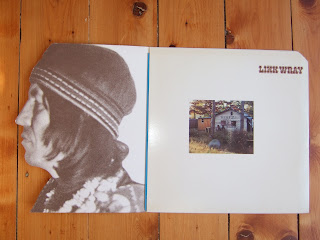Krautrock's wealth of musical curios has been extensively excavated over the past 15 years but Broselmaschine strangely remains in the shadows.
Perhaps the album just doesn't fit in the freak rock image with which the era is best associated.
Rather than the wild strangeness of Amon Duul II's Phallus Dei, the Faust Tapes, Can's Tago Mago or Klaus Schulze's Irrlicht, Broselmaschine contains an idyllic pastoral haze that cocoons you in its blissful shimmer.
 Considering its continuing obscurity, it's curious that Broselmaschine drew more influences from England than their contemporaries.
Considering its continuing obscurity, it's curious that Broselmaschine drew more influences from England than their contemporaries.The early Canterbury scene can be detected but Pentangle are the obvious frame of reference, as reflected by a line-up including two virtuoso guitarists (Peter Bursch and Willi Kismer) and a female singer (Jenni Schucker).
Schucker also plays flute and her dreamy vocal style - halfway between a semi-comatose Jacqui McShee and Grace Slick - gives this album much of its charm.
The other key factor is the interplay between Bursch and Kismer, the former usually on acoustic guitar while the latter plays electric.
The way Kismet's wah-wah guitar intertwines with Bursch and Schucker's flute on the intro to The Old Man's Song is just magical.
That hoary old folk standard Lassie even sounds refreshed in their hands, with Kismer's solo adding a heady hippy vibe.
Sitar and tablas give Schmetterling an Eastern flavour that fortunately never slumps into raga drone, instead skipping about impishly, introducing a funky bassline eight minutes in and even finishing off with a mellotron flourish.
There isn't a weak moment to be found on the whole album, which sustains its entrancing mood effortlessly through six songs and 34 minutes.
The gatefold sleeve's drawings of castle with butterflies, bats, sprites and mushrooms completes the groovy period ambiance.
Schucker disappeared off to who knows where after Broselmaschine's release and never graced a recording studio again.
The band recorded a second album without her as Peter Bursch and Broselmaschine in 1974 with the help of a couple of Guru Guru members, but not even the presence of Conny Plank in the producer's chair could replicate the magic of their debut.






